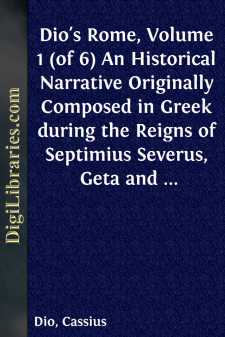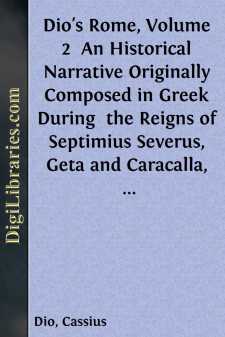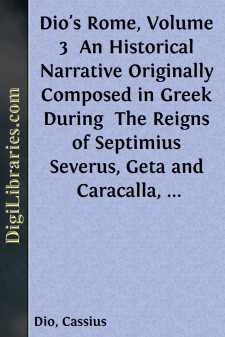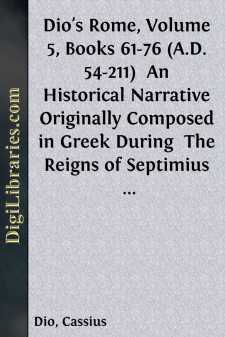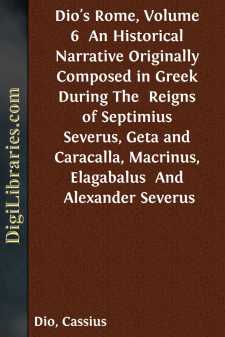History
- Africa 30
- Americas (North Central South West Indies) 50
- Ancient
- Asia 58
- Australia & New Zealand 8
- Canada 41
- Caribbean & West Indies 1
- Civilization 20
- Eastern Europe 12
- Europe 310
- Expeditions & Discoveries 60
- General 77
- Historical Geography 1
- Jewish 9
- Latin America 3
- Medieval 8
- Middle East 13
- Military 248
- Revolutionary 8
- Study & Teaching 5
- United States 353
- Western Europe 56
- World 13
Ancient Books
Sort by:
by:
Cassius Dio
Four hundred and seven small pages, over and above the Epistle Dedicatory, are contained in Volume One. Really, however, this is not the true Dio at all, but merely his shadow, seized and distorted to satisfy the ideas of his epitomizer, the monk Xiphilinus, who was separated from him by a thousand years in the flesh and another thousand in the spirit. Of the little specimens here and there translated...
more...
by:
Cassius Dio
BOOK 36, BOISSEVAIN.) The beginning of this book is missing in the MSS. The gist of the lost portion may in all probability be gathered from the following sentences of Xiphilinus (p. 3, R. Steph.): "When the consuls drew lots, Hortensius obtained the war against the Cretans. Because of his fondness, however, for residence in the capital, and because of the courts (in which his influence was only...
more...
by:
Cassius Dio
BOOK 45, BOSSEVAIN.) [B.C. 44 (a. u.710)] [-1-] This was Antony's course of procedure.вÐâGaius Octavius Copia,вÐâthis was the name of the son of Caesar's niece, Attia,вÐâcame from Velitrae in the Volscian country, and having been left without a protector by the death of his father Octavius he was brought up in the house of his mother and her husband, Lucius...
more...
by:
Cassius Dio
(BOOK 52, BOISSEVAIN) [-1-] My record has so far stated what the Romans both did and endured for seven hundred and twenty-five years under the monarchy, as a democracy, and beneath the rule of a few. After this they reverted to nothing more nor less than a state of monarchy again, although Cæsar had a plan to lay down his arms and entrust affairs to the senate and the populace. He held a consultation...
more...
by:
Cassius Dio
DURATION OF TIME M. Asinius Marcellus, Manius Acilius Aviola. (A.D. 54 = a.u. 807 = First of Nero, from Oct. 13th). Nero Caesar Aug., L. Antistius Vetus. (A.D. 55 = a.u. 808 = Second of Nero). Q. Volusius Saturninus, P. Cornelius Scipio. (A.D. 56 = a.u. 809 = Third of Nero). Nero Caesar Aug. (II), L. Calpurnius Piso. (A.D. 57 = a.u. 810 = Fourth of Nero). Nero Caesar...
more...
by:
Cassius Dio
BOOK 78, BOISSEVAIN.) [Sidenote: A.D. 211 (a.u. 964)] [Sidenote:—1—] After this Antoninus secured the entire power. Nominally he ruled with his brother, but in reality alone and at once. With the enemy he came to terms, withdrew from their country, and abandoned the forts. But his own people he either dismissed (as Papinianus the prefect) or else killed (as Euodus, his nurse, Castor, and his wife...
more...
CHAPTER I. GIBBON'S EARLY LIFE UP TO THE TIME OF HIS LEAVING OXFORD. Edward Gibbon was born at Putney, near London, on 27th April in the year 1737. After the reformation of the calendar his birthday became the 8th of May. He was the eldest of a family of seven children; but his five brothers and only sister all died in early infancy, and he could remember in after life his sister alone, whom he...
more...
by:
Charles Morris
HOW ROME WAS FOUNDED. Very far back in time, more than twenty-six hundred years ago, on the banks of a small Italian river, known as the Tiber, were laid the foundations of a city which was in time to become the conqueror of the civilized world. Of the early days of this renowned city of Rome we know very little. What is called its history is really only legend,—stories invented by poets, or ancient...
more...
CHAPTER I—THE CRUSADERS IN EGYPT The Ideal of the Crusader: Saladin's Campaign: Richard I. in Palestine: Siege of Damietta: St. Louis in Egypt: The Mamluks: Beybars' Policy. The traditional history of the Christian Church has generally maintained that the Crusades were due solely to religious influence and sprang from ideal and moral motives: those hundreds of thousands of warriors who went...
more...
INTRODUCTORY ESSAYHELLENISM AND HEBRÆISM IN EGYPT UNDER THE PTOLEMIESI.When Alexander the Great bridged the gulf dividing Occident and Orient, the Greeks had attained to a state of maturity in the development of their national art and literature. Greek culture and civilisation, passing beyond the boundaries of their national domain, crossed this bridge and spread over the Asiatic world. To perpetuate...
more...


